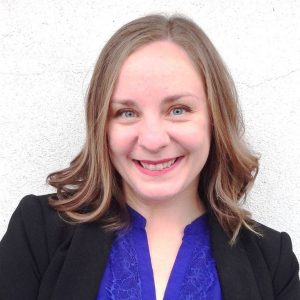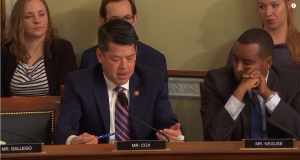May 28, 2019
Students in Science Policy: Science Policy Fellowships
Posted by Caitlin Bergstrom
Note: Katie was interviewed prior to the start of the 116th Congress.
Are you nearing the end of your degree and not sure what to do next? A great way to jump into the science policy world is through the AGU Congressional Science Fellowship. Every year AGU sponsors a fellow to work in the offices of either an individual member of Congress or on a committee for a one-year assignment. AGU’s 2018-2019 fellow, Kathryn (Katie) Harris, is an archaeologist with experience in both social and geosciences. She received her bachelor’s degree from Utah State University, then went on to Washington State University for her PhD. Her graduate research explored how people in Mongolia and the U.S. Pacific Northwest deal with changing climates and economies in the archaeological past and present. While at Washington State University, she served as the legislative liaison for WSU graduate-professional students and the National Association of Graduate-Professional Students. In this role she guided national advocacy campaigns on education, immigration, health insurance, and science policy for graduate-professional students throughout the country. She is currently working in the House Committee on Natural Resources. Laura Lyon, AGU’s Fall 2018 Public Affairs intern spoke with Katie about her experience working in Congress and how she transitioned from geoscience to science policy.
What is your current position? What is a day like at your current position?
“I am currently the 2018-2019 AGU/AAAS Congressional Science Fellow. I am placed with the House Committee on Natural Resources (Democrats). Each day is a little different. There’s quite a bit of issue-based research – I joke it’s like a million mini-dissertations – but there’s also meetings with outside groups. Right now, there’s also lots and lots of planning for the new Congress. I’m told things are going to get crazy busy with Democrats in the majority. I’m prepping to run hearings in the Spring.”
Update from Katie for the Fellowship interview blog post:
“Things have definitely changed since I last answered that question- the committee has now held multiple hearings, and preparing for these hearings take up the bulk of my time. For each hearing, I recruit witnesses, write background memos, and draft questions/brief Members of Congress. The other big, new piece of my work is preparing document requests and oversight letters to send to the executive branch. I also spend time following up on these requests, and sifting through documents received in response. At the same time, I still meet with stakeholder groups, work on legislation, and talk with personal offices regarding their priorities.”
What led you to apply to a science policy fellowship?
“I’ve been interested in the intersection of science and policy for a long time – since undergrad at least – but after I started doing advocacy work, it felt like a lightbulb went off. I had found a way to apply my knowledge and skills to do something good and solve real problems.”
What skills from your PhD prepared you for your fellowship?
“Resourcefulness: finding the right people, then finding the right information, in pursuit of a larger goal. Clear writing and quick reading. Distilling complex concepts into simple sentences. Knowing how to take edits and feedback to get better. Interacting with lots of different people. Tenacity.”
How did you feel entering the policy field without formal education in political science or public policy?
“Very excited – the fellowship was a dream position for me and something I had been thinking about for a long time. I held legislative advocacy positions while I was a PhD student for over 2 years, and they taught me a lot about policy I wouldn’t have learned as a regular student.
What was an unexpected challenge that you have faced during your fellowship?
“Feeling like a total dummy and briefly losing confidence in myself. Going into the fellowship, I was very aware that I would be a newbie in a very different world, but I didn’t anticipate how disorienting it would be. It took me a couple months before I started to feel confident in myself and my skills again.”
What advice do you have for students interested in pursuing a career in science policy?
“Seek out opportunities to engage in science policy while you’re still a student – there are so many! AGU has great resources for engagement, as does AAAS. I think it’s very common for grad students to “keep their nose to the grindstone” with their research. But honestly, I think that gaining skills outside of my research is 80% of what I use now. And get good at networking – It isn’t scary once you start doing it.”
Interested in a Congressional Fellowship? Learn more about the terms and selection criteria as well as other fellowship opportunities. Applications for the AGU Congressional fellowship are typically due in January, and the written application for the AAAS Science & Technology fellowship is due in November (here are some tips for those interested). Be sure to follow @AGUSciPolicy on Twitter where we announce updates on the fellowship and other great science policy resources.









